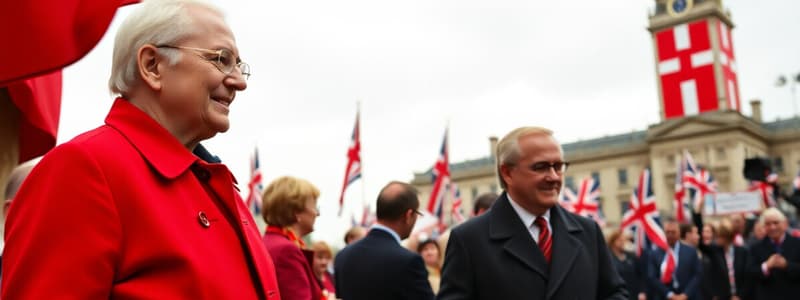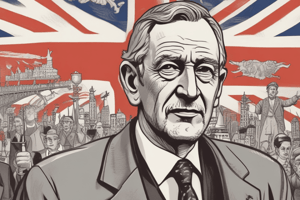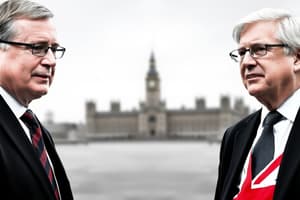Podcast
Questions and Answers
What was the first Labour government led by?
What was the first Labour government led by?
- MacDonald (correct)
- Lloyd-George
- Asquith
- Cameron
Which political party was not able to form a government after 1922?
Which political party was not able to form a government after 1922?
- Conservative Party
- Labour Party
- Green Party
- Liberal Party (correct)
Why did the Labour Party become increasingly attractive to the population?
Why did the Labour Party become increasingly attractive to the population?
- It supported the Liberal policies.
- It was associated with upper-class interests.
- It focused on the needs of the working class. (correct)
- It had a majority government from the start.
How many coalition governments were formed during the World Wars?
How many coalition governments were formed during the World Wars?
What year did Labour Party lose its overall majority under Callaghan?
What year did Labour Party lose its overall majority under Callaghan?
What was the original name of the Labour Party?
What was the original name of the Labour Party?
What significant change occurred in the membership of the Labour Party in 1918?
What significant change occurred in the membership of the Labour Party in 1918?
Who were the founding members of the Labour Party?
Who were the founding members of the Labour Party?
What was the purpose of 'The Cat and Mouse Act' passed in 1913?
What was the purpose of 'The Cat and Mouse Act' passed in 1913?
During WW1, how did women's contributions change perceptions about their voting rights?
During WW1, how did women's contributions change perceptions about their voting rights?
What age restriction was placed on women's voting in 'The Representation of the People Act of 1918'?
What age restriction was placed on women's voting in 'The Representation of the People Act of 1918'?
Which of the following women threw herself under the King's horses as a form of protest?
Which of the following women threw herself under the King's horses as a form of protest?
What significant change occurred regarding the ban on broadcasting information by the BBC?
What significant change occurred regarding the ban on broadcasting information by the BBC?
Which newspapers emerged at the beginning of the 20th century?
Which newspapers emerged at the beginning of the 20th century?
Which private broadcasting company was created in 1956?
Which private broadcasting company was created in 1956?
Why did politicians in the early 20th century prioritize improving living conditions over women's political rights?
Why did politicians in the early 20th century prioritize improving living conditions over women's political rights?
What was a significant aspect of Scotland's governance in relation to its own government?
What was a significant aspect of Scotland's governance in relation to its own government?
What was the initial stance of the media owners regarding political parties?
What was the initial stance of the media owners regarding political parties?
How did the introduction of popular newspapers affect public perception?
How did the introduction of popular newspapers affect public perception?
When were Welsh state schools permitted to teach the Welsh language?
When were Welsh state schools permitted to teach the Welsh language?
Which church retained full autonomy in Scotland confirmed by an Act in 1921?
Which church retained full autonomy in Scotland confirmed by an Act in 1921?
What role did the BBC play during the general strike of 1926?
What role did the BBC play during the general strike of 1926?
Which entity had a significant influence on the creation of satellite television in the 1990s?
Which entity had a significant influence on the creation of satellite television in the 1990s?
What was a major religious concern for the Welsh population?
What was a major religious concern for the Welsh population?
What was the primary basis for the unification of Ireland with the UK in 1900?
What was the primary basis for the unification of Ireland with the UK in 1900?
What was the focus of the demands made by 'The Irish Party' led by Charles Parnell?
What was the focus of the demands made by 'The Irish Party' led by Charles Parnell?
What was the outcome of the 3rd Home Rule Bill in 1912?
What was the outcome of the 3rd Home Rule Bill in 1912?
What political party emerged in Ireland in 1905 demanding full independence?
What political party emerged in Ireland in 1905 demanding full independence?
What was the significance of the 1916 uprising in Dublin?
What was the significance of the 1916 uprising in Dublin?
What action did Sinn Féin take after winning a majority in the 1918 general elections?
What action did Sinn Féin take after winning a majority in the 1918 general elections?
What was the nickname given to the British troops sent to Ireland during the conflict?
What was the nickname given to the British troops sent to Ireland during the conflict?
What was the main result of the negotiations that took place by 1921?
What was the main result of the negotiations that took place by 1921?
What was a key issue regarding the education of working-class children?
What was a key issue regarding the education of working-class children?
What did the 1902 Education Act establish about primary education?
What did the 1902 Education Act establish about primary education?
What conditions did around 90% of the population face regarding housing at the beginning of the 19th century?
What conditions did around 90% of the population face regarding housing at the beginning of the 19th century?
What was introduced in 1921 to support working-class children in schools?
What was introduced in 1921 to support working-class children in schools?
What was a major issue with the housing situation for workers in the 19th century?
What was a major issue with the housing situation for workers in the 19th century?
What event occurred in 1915 regarding rent among private tenants in Glasgow?
What event occurred in 1915 regarding rent among private tenants in Glasgow?
Who created the first Council Houses in Britain?
Who created the first Council Houses in Britain?
Why were subsidies for building Council Houses reduced in the 1930s?
Why were subsidies for building Council Houses reduced in the 1930s?
What was the primary function of the Trades Union Congress?
What was the primary function of the Trades Union Congress?
What significant change did the Trade Disputes Act of 1906 bring about?
What significant change did the Trade Disputes Act of 1906 bring about?
Which factor led to the escalation of Trade Union power after World War I?
Which factor led to the escalation of Trade Union power after World War I?
What was the outcome of the general strike attempt in 1926?
What was the outcome of the general strike attempt in 1926?
What type of agreement is a closed shop?
What type of agreement is a closed shop?
What was a consequence of the failed coal miner strike after World War I?
What was a consequence of the failed coal miner strike after World War I?
What restriction was placed on strikes during World War I?
What restriction was placed on strikes during World War I?
What was the government's response after the failed general strike?
What was the government's response after the failed general strike?
Flashcards
UK Political Parties (1900s)
UK Political Parties (1900s)
The Conservative, Liberal, and Labour Parties were the major political forces in the UK during the 20th century.The Labour Party, founded in 1900, gained popularity among the working class, eventually becoming a major party.
Labour Party's Formation
Labour Party's Formation
The Labour Party emerged in the early 20th century, formed by trade unions and the Fabian Society. Initially called the Labour Representation Committee, it became the Labour Party in 1906.
Minority Government
Minority Government
A government in which the ruling party does not have total control of the parliament. Often, support of other parties may be needed to form a government.
Coalition Government
Coalition Government
Signup and view all the flashcards
Liberal Party Decline
Liberal Party Decline
Signup and view all the flashcards
Political Changes After WWI
Political Changes After WWI
Signup and view all the flashcards
UK Political System
UK Political System
Signup and view all the flashcards
Cat and Mouse Act
Cat and Mouse Act
Signup and view all the flashcards
Women's Suffrage Movement
Women's Suffrage Movement
Signup and view all the flashcards
Representation of the People Act 1918
Representation of the People Act 1918
Signup and view all the flashcards
Women's role in WW1
Women's role in WW1
Signup and view all the flashcards
Limited women's vote (1918)
Limited women's vote (1918)
Signup and view all the flashcards
Media Influence (early 20th century)
Media Influence (early 20th century)
Signup and view all the flashcards
Emily Davison
Emily Davison
Signup and view all the flashcards
Elite ownership of media
Elite ownership of media
Signup and view all the flashcards
BBC's role in 1926 general strike
BBC's role in 1926 general strike
Signup and view all the flashcards
ITV (1956)
ITV (1956)
Signup and view all the flashcards
Channel 4 (1980)
Channel 4 (1980)
Signup and view all the flashcards
Murdoch's Sky Group
Murdoch's Sky Group
Signup and view all the flashcards
Scottish Governmental Ministry
Scottish Governmental Ministry
Signup and view all the flashcards
Welsh Language Preservation
Welsh Language Preservation
Signup and view all the flashcards
Disestablishment of Welsh Church
Disestablishment of Welsh Church
Signup and view all the flashcards
British Broadcasting Corporation (BBC) Monopoly
British Broadcasting Corporation (BBC) Monopoly
Signup and view all the flashcards
Press Influence pre-1928
Press Influence pre-1928
Signup and view all the flashcards
Irish Home Rule
Irish Home Rule
Signup and view all the flashcards
Sinn Féin
Sinn Féin
Signup and view all the flashcards
1916 Easter Rising
1916 Easter Rising
Signup and view all the flashcards
Dail Eireann
Dail Eireann
Signup and view all the flashcards
Anglo-Irish Treaty (1921)
Anglo-Irish Treaty (1921)
Signup and view all the flashcards
Irish economy in 1900
Irish economy in 1900
Signup and view all the flashcards
Partition of Ireland
Partition of Ireland
Signup and view all the flashcards
Irish political divisions
Irish political divisions
Signup and view all the flashcards
Trades Union Congress
Trades Union Congress
Signup and view all the flashcards
Industrial Strike
Industrial Strike
Signup and view all the flashcards
Trade Disputes Act (1906)
Trade Disputes Act (1906)
Signup and view all the flashcards
General Strike (1926)
General Strike (1926)
Signup and view all the flashcards
Closed Shop
Closed Shop
Signup and view all the flashcards
Secondary Picketing
Secondary Picketing
Signup and view all the flashcards
General Strike Failure (1926)
General Strike Failure (1926)
Signup and view all the flashcards
WW1 Strike Exceptions
WW1 Strike Exceptions
Signup and view all the flashcards
Contracting out (Trade Unions)
Contracting out (Trade Unions)
Signup and view all the flashcards
19th Century Working-Class Education
19th Century Working-Class Education
Signup and view all the flashcards
Compulsory Primary Education
Compulsory Primary Education
Signup and view all the flashcards
1902 Education Act
1902 Education Act
Signup and view all the flashcards
School Meals (1921)
School Meals (1921)
Signup and view all the flashcards
19th Century Housing Ownership
19th Century Housing Ownership
Signup and view all the flashcards
Housing Conditions (19th Century)
Housing Conditions (19th Century)
Signup and view all the flashcards
1915 Glasgow Rent Strike
1915 Glasgow Rent Strike
Signup and view all the flashcards
Council Houses (1920s)
Council Houses (1920s)
Signup and view all the flashcards
Housing Subsidies (1930s)
Housing Subsidies (1930s)
Signup and view all the flashcards
Study Notes
Political Parties
- Prior to the 20th century, only the Conservative and Liberal parties held power.
- The Labour party emerged in the 20th century.
- MacDonald led the first Labour minority government.
- Labour formed its first majority government in 1945.
- The Liberal party fractured after 1922, and ceased to form governments.
- The Conservative party was always a major party.
- Coalition governments featuring multiple parties were formed during wartime (WW1 and WW2), and economic crises.
- The Labour Party was founded in 1900 by Trade Unions and the Fabian Society, with significant Trade Union influence.
- Initially, Labour membership was limited to members of organizations; membership became open to individuals after 1918.
- Labour aimed at widespread ownership of resources and a more equitable distribution of wealth.
- The Labour party, aimed at the lower class and the middle class, became more popular than the Liberal party.
- Similar far-right (e.g., the New Party) and far-left (communist) parties emerged in the UK during this period, but didn't gain significant influence.
British Institutions: Monarchy
- Queen Victoria (1837-1901) ruled during the majority of the 19th century.
- Edward VII (1901-1910) and George V (1910-1936) and then Edward VIII followed.
- Edward VIII abdicated to marry Wallis Simpson who had a contentious history of divorce.
- George VI ascended the throne during WWII and was closer to the public, and reigned through WWII.
British Institutions: Parliament
- A significant 1911 reform altered the powers of the House of Lords. Previously, both houses held equal power, and a bill could be blocked. Now the House of Lords could delay a bill but not block it permanently.
- A "People's Budget" (1909), introduced by Lloyd George (the Chancellor of the Exchequer) imposed higher taxes on the wealthy to fund social welfare programmes, leading to a clash with the aristocratic House Of Lords.
- 1911 Parliament Act to limit the power of the house of lords.
- In 1918, a new Representation of the People Act expanded voting rights, extending suffrage to men and women, and removing residence requirements for voting.
British Institutions: Women
- The suffragette movement played a key role, advocating for women's right to vote.
- Some movements used more aggressive tactics, including hunger strikes.
- Emily Davidson was a leading Suffragette.
- In 1918, a measure was passed granting voting rights to some women.
- In 1928, voting laws were revised again and women had the same voting rights as men.
British Institutions: The Media
- The press had a huge influence, particularly the popular press.
- They were quite concerned about the Labour Party rising during the 1920's.
- False accusations regarding the Labour party, and its alleged ties to communism, were presented to the public, which sought to harm Labour's public image.
- Broadcast media (radio and television) emerged and developed. The BBC was initially a monopoly.
British Institutions: Scotland and Wales
- Scotland had separate ministries within the British government, overseeing many aspects.
- Wales did not have a separate ministry but there were concerns about preserving the Welsh language which were addressed in state schools.
- Established Church Of England was disestablished in Wales.
British Institutions: Ireland
- Ireland was part of the United Kingdom but had significant differences, and a history of colonial influence.
- The Irish Party (led by Charles Parnell) sought Home Rule (Ireland governing itself).
- Sinn Fein emerged, demanding independence.
- The 1916 Easter Rising led to a decisive shift in Irish public opinion towards independence.
- The Irish Free State was created in 1922.
- Northern Ireland remained part of the United Kingdom, facing tensions and political divisions between different religious communities.
Chapter 2: Economic Decline
- Britain experienced economic decline after the industrial revolution. Britain's heavy industries faced increasing competition from Germany and the USA.
- Unemployment increased significantly, especially in the North of England and Scotland which resulted in the formation of the first employment exchange in the Asquith government.
- The Great Depression of 1929 worsened economic conditions further.
- The government started to play a bigger role in social life including the formation of the Special Areas act (1934) for economic support to specific locations.
- The 1929 economic crisis saw a rise in unemployment from 2,000,000 to 3,000,000 people, and especially affected the North of England and Scotland.
Chapter 3: The First Social Policies
- Trade Unions gained recognition and membership during this period.
- Strikes and labor disputes (including general strikes) became frequent occurrences.
- Legislation aimed at mitigating some of the hardships from these disputes. (e.g. Trade Disputes act 1906)
- Public education was improved and expanded, introducing compulsory education laws.
- Significant efforts were made regarding housing, e.g the 1915 strike of private tenants to have their rent reduced (by Wheatley).
Chapter 4: From The Empire To The Commonwealth
- Imperial decline was evident as colonies aimed for self-governance.
- The League of Nations was founded to avoid conflict.
- WW1 placed a heavy toll on the empire, and many casualties were reported.
- The end of the Great War saw huge changes to the empire.
- Reports were generated showing the effects of the Great War on the public.
- The 1916 Easter Rising saw significant levels of upheaval in Ireland.
- WW2 saw the expansion of British forces in Europe and beyond, and the establishment of several support institutions. (e.g. the 1942 Beveridge report)
- Post-war Britain faced significant challenges to rebuilding the economy and institutions from these major periods.
Chapter 5: First Benefits
- Prior to WW1, minimal social welfare existed for the working class.
- The very first steps towards pensions, health, and unemployment benefits were established by the Liberal gov.
- The 1931 benefits were universal or means-tested.
Studying That Suits You
Use AI to generate personalized quizzes and flashcards to suit your learning preferences.




